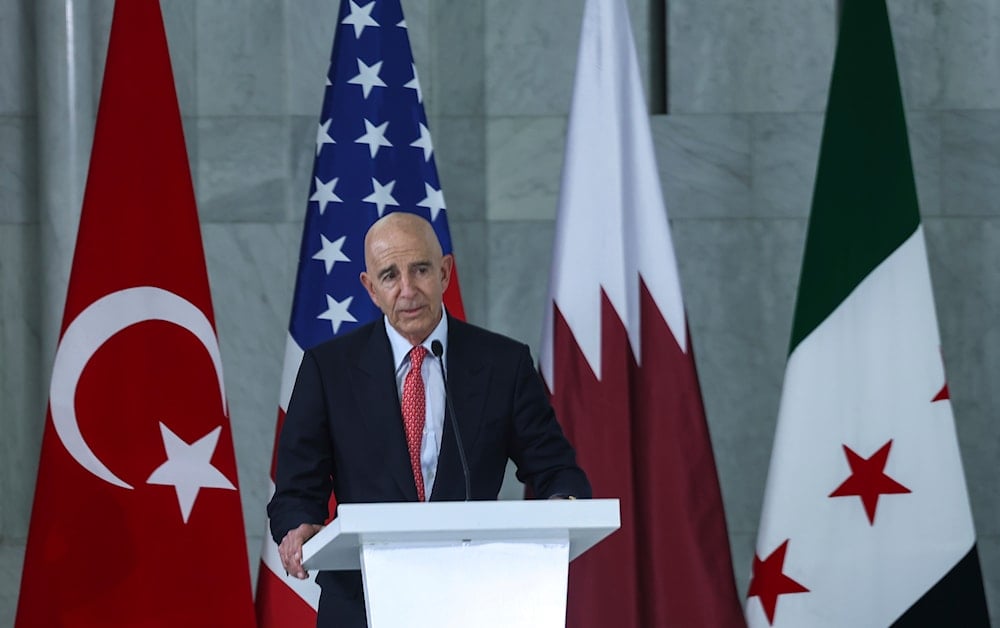US backs Syria-Israeli talks, disarmament of Resistance: NYT
Syria is in high-level talks with "Israel" to restore calm, backed by US efforts under Trump’s administration. Discussions include normalization, foreign fighters, and sanctions relief.
-

US envoy Tom Barrack at a Qatari-Turkish-American energy deal signing in Damascus, May 2025 (AP)
Damascus and Tel Aviv are engaged in high-level talks aimed at "restoring calm", according to Thomas J. Barrack Jr, a top Middle East envoy for US President Donald Trump, with Washington actively supporting the discussions as part of its regional stabilization efforts.
In an interview with The New York Times, Barrack, the US ambassador to Turkey and special envoy to Syria, expressed the American administration’s desire for Syria to join normalization agreements. However, he cautioned that the process could take time, as Syria’s new president, Ahmad al-Sharaa, might face domestic resistance.
Barrack warned that this process could take time, as Syria’s new president, Ahmad al-Sharaa, might face resistance at home. Additionally, he emphasized that al-Sharaa cannot be perceived by his people as pressured or compelled into normalization, which is why he needs to move cautiously.
The envoy claimed that "everyone in this region respects only strength, and Trump has proven that America’s strength is a prerequisite for peace," while also pointing out that "progress in democratic transformation and inclusive governance will not happen quickly, and these are not part of the American criteria."
The case of foreign fighters
In a related context, US officials expressed concern about the thousands of foreign fighters who entered Syria to join the war.
Barrack explained that Washington has recognized "Syria cannot expel those who remain within its borders, and that they may pose a threat to the new government if marginalized," which is why the Trump administration expects transparency regarding their assigned roles.
Syria and sanctions
On the topic of Trump's executive order ending decades of US sanctions on Syria, Barrack explained, "that rather than imposing strict demands, the administration has set achievable goals for the Syrian government to work toward while Washington monitors their progress."
He added that these benchmarks include "achieving a peaceful settlement with Israel, integrating the US-backed Kurdish-led militias controlling northeast Syria, and investigating the fate of Americans lost during the war."
Barrack stated that "lifting sanctions to encourage change had proven more effective than maintaining them until Syria meets specific demands," while acknowledging that the successive sanctions regimes had never achieved their intended results.
On the ceasefire in Lebanon
On another front, Barrack described the ceasefire in Lebanon as a "complete failure," explaining that "Israel continues to bomb Lebanon while Hezbollah violates the agreement's terms."
Barrack claimed that "disarming Hezbollah requires a carrot-and-stick approach, in additional to having the Lebanese Army conduct house-to-house weapons searches."
Barrack suggested that "this process could provoke backlash from Shiite communities, which have long viewed Hezbollah as Lebanon’s defender and the vanguard of resistance against Israel," emphasizing the potential for widespread discontent.

 3 Min Read
3 Min Read









